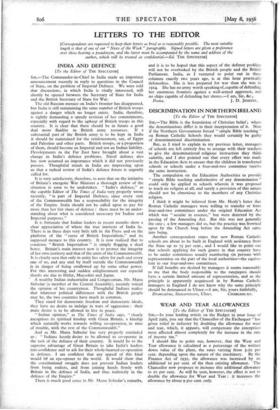DISCRIMINATION IN NORTHERN IRELAND
- [To the Editor of THE SPECTATOR] Sta,—The Bible is the foundation of Christian belief; where the denominations differ is in their interpretation of it. Now if the Northern Government forced" siinple. Bible teaching" on Roman Catholic Schools they would certainly be guilty of denominational discrimination.
But, as I tried to explain in my previous letter, managers of schools are left entirely free to arrange with their teachers to give the denominational religious- instruction they think suitable, and I - also pointed out that every effort was made in the Education Acts to ensure that the children in transferred schools or schools tinder a four-and-two committee 'receive the same instruction.
The compulsion on the Education Authorities to provide "simple Bible teaching undistinctive of any denomination" could only be applied to schools wherein it was proposed to teach no religion at all, and surely a provision of this nature should not be obnoxious to the members of any Christian religion.
I think it might be inferred from Mr. Healy's letter that Roman Catholic managers were willing to transfer or form four-and-two committees under the original Education Act which was "secular in essence," but were deterred by the passing of the Amending Act. But this was not generally the case ; a few managers did so, but the practice was frowned upon by the Church long before the Amending Act came into being.
Another correspondent states that new Roman Catholic schools are about to be built in England with .assiitance from the State up to 75 per cent., and I would like to point out that schools applying' for such giants in that country have to be under committees usually numbering six-Persons with representation on the part of the local authorities—the equiva- lent to our four-and-two committees.
If full benefits are desired by managers it seems reasonable to me that the body responsible to the ratepayers should have a certain limited amount of representation; and as the principle is apparently acquiesced in by Roman Catholic managers in England I do not know why the same principle should be denounced in Ulster.—I am, Sir, yours faithfully,
Drumcairne, Stewartstown, Ulster. CHARLEMONT.


































































 Previous page
Previous page